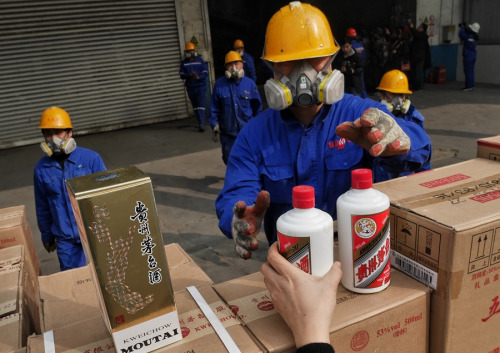
Inspectors take inventory of seized fake Moutai liquor that is about to be destroyed in Beijing on Tuesday. (WANG JIANING/FOR CHINA DAILY)
With increasing incomes, people become more sensitive to quality
In the latest consumer trend, Chinese shoppers are complaining less about merchandise and more about services.
To mark World Consumer Rights Day on Thursday, the State Administration for Industry and Commerce released a report based on five years of data analysis showing that complaints about tangible goods, while still rising, have been growing at a slower pace since 2013.
As a share of the total, such complaints fell from 64.1 percent to 50.3 percent last year. By contrast, complaints about services have been accelerating, rising from 35.9 percent to 49.7 percent since 2013.
"This indicates that merchandise quality in the country has significantly improved, and consumers are demanding better services," Zhou Shiping, the State regulator's director of consumer rights and interests protection, said on Wednesday in Beijing.
Zhou said the total number of complaints logged since 2015 hit a high-water mark in 2017, reflecting a widening awareness by consumers that they can defend their rights.
Last year, consumers filed more complaints related to online shopping, services and upscale merchandise-goods that signal a desire for higher quality and a better living standard, such as those related to culture and entertainment, cosmetics, computers and electrical appliances.
The administration dealt with 1.2 million complaints on merchandise last year and 1.19 million about services.
With Chinese consumers' increasing consumption power and shift to upscale buying, complaints on cultural, sports and entertainment products rose by 107.9 percent year-on-year in 2017. Complaints about cosmetics were up by 76.3 percent, and those about computers were up by 27.4 percent.
Consumers also appear to have had bad experiences in shopping for home decorating merchandise and services, with complaints growing 86.4 percent year-on-year.
Rental services and intermediary services complaints were up 790 percent and 49.7 percent respectively.
Internet shopping is a major battlefield for complaints. In 2017, the regulator received 685,700 complaints related to online purchases, a 184.4 percent increase over 2016.
Consumers who filed such complaints lived mostly in Zhejiang province (34 percent), Guangdong province (26.5 percent), Beijing (15 percent), Shanghai (6.5 percent) and Jiangsu province (4.3 percent).
Deceptive advertising, substandard product quality and poor after-sale support were the main complaints. Of those, about 3,516 were against business operators who refused to unconditionally return merchandise within seven days.
The report noted that rural residents have also lodged more complaints as their incomes have increased. In 2017, complaints from rural areas rose to 73,500, a 66.4 percent increase year-on-year. The figure was 20.5 percentage points higher than that from of urban residents.
In March last year, the administration launched an online platform-12315.cn-to make it easier to report complaints. Since then, it has handled 385,900 cases online.
By the end of last year, the platform had registered about 550,000 users and counted 9 million online visits.
The administration pursued 40,192 violations over merchandise quality that were valued at 128.9 million yuan ($20.4 million) in 2017, and it assessed 32.6 million yuan in fines.
In the service sector, 6,778 violations valued at 3.38 million yuan were reported, and fines totaled 6.52 million yuan. The authority found 18 cases of suspected monopolizing and 862 cases of restricting fair competition.
The administration has also set up a State-level enterprise credit information presentation system, preventing 207,900 people from being appointed as corporate executives.


















































